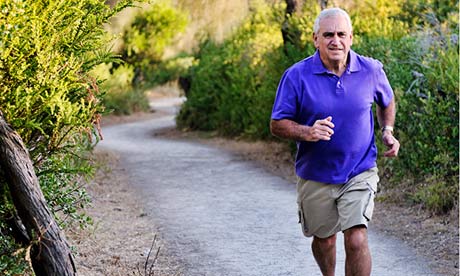
For many people reminiscing about their childhood sporting memories, the first activity that springs to mind is the dreaded cross-country run. Images of cold, wet days spent slogging around muddy fields; the sound of sadistic PE teachers barking instructions still ringing in the ear. These are not fond memories. Indeed, running was, and still is, frequently viewed as a punishment; the sort of thing that no child in their right mind would want to do voluntarily, let alone enjoy.
One of the ironies of the current boom in participation is that while unprecedented numbers of people are taking up running, many of these people are in their 30s or above. It was hoped that the 2012 Olympics would "inspire a generation" – but it wasn't really part of the plan for that generation to be aged 30-60. Recent reports suggest that child fitness levels still aren't what they should be, with nearly half of all children not taking the government's recommended one hour of exercise a day.
Although any new runners are fairly good news for public health officials, the age profile of the current crop means they are less likely to make inroads into the thorny issue of running "standards". It has been well documented that times are generally slower now than they were in the 80s, but the fact that runners are starting older doesn't always mean that they can't pop up at the sharp end of races.
Running is one of the few sports at which it is possible, albeit with a lot of hard work and a bundle of talent, to progress to elite status despite only taking it up in your 30s. One of the best examples is the great Jack Foster, the Liverpool-born New Zealander and self-styled "ancient marathoner", who pulled on a pair of trainers for the first time at the age of 32 and by age 40 found himself running 2:11 for the marathon, picking up a silver medal for his efforts at the Christchurch Commonwealth Games in 1974.
At a slightly lower level, Welshman Martin Rees this year became the proud holder of the age 60 World Best times for the half marathon (71:30) and 10km (32:54), after a glorious couple of decades during which heas run incredible times over a full range of distances from 5k (14:20) to the marathon (2:23). He only took up the sport in his late 30s and soon got the running bug.
Of course, while we all may hold secret hopes of uncovering an latent talent, most of us are unlikely to progress to the very front of the pack. But the exploits of the likes of Foster and Rees are relevant to all of us, whether we like to race on a weekend or prefer to battle our own limitations on solitary excursions through the countryside.
The message is that age is far less of a barrier to improvement in running than it is in other sports. While the amateur footballer is confronted, aged 40, with his or her place in the team being given to the latest young talent, the amateur runner is often just getting going.
With running, especially if taken up later in life without any previous experience, it really is realistic to expect to improve with age – albeit with some upper limit, though Rees seems to be getting faster and faster. It is this expectation that can ensure the motivation to continue remains well into our senior years.
Who knows where it will take you? The never-ending setting of targets and the tangible results keep us coming back for more and more.

